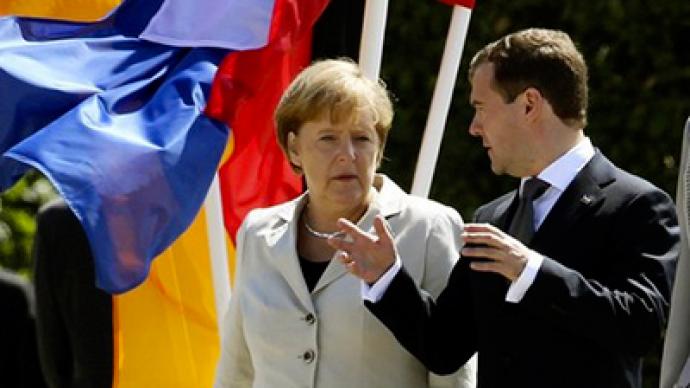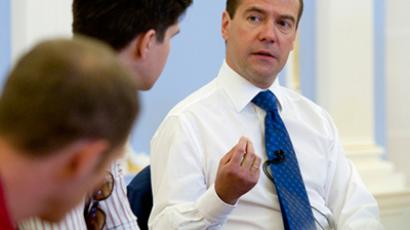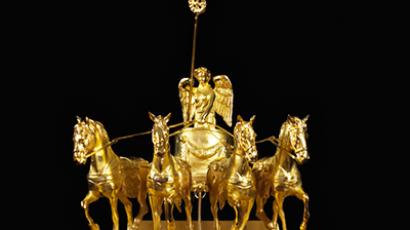Medvedev blasts Quadriga prize trustees over inconsistency

The decision not to hand in the Quadriga award to the announced nominees, including to Prime Minister Vladimir Putin, is a sign of inconsistency and cowardice, believes President Dmitry Medvedev.
He made the statement during a joint news conference with German Chancellor Angela Merkel, following their talks in Hannover. A journalist asked the German leader about the circumstances surrounding the award, but Angela Merkel refused to comment on the issue. However, president Medvedev could not to pass on the topic once it was raised. “I did not want to talk about that, but I will give you my opinion on the Quadriga award, although the question was not addressed to me,” he said. “It is in fact, Germany’s headache, not Russia’s. But I believe that any non-governmental organization which gives awards is free to choose … who they like and who they don’t like. But once the decision is taken, it should be stuck to. Otherwise, it is a demonstration of cowardice and inconsistency,” he stressed. "In any case, it's finished as far as the international community is concerned," Medvedev added.On Monday, the trustees of the annual German Quadriga prize, which has been handed out by a private organization since 2003, announced they were not going to hand it out in 2011. The decision was prompted by a wave of strong media criticism, which came about as a result of the announcement that one of the laureates for the 2011 Quadriga prize would be Russian Prime Minister Vladimir Putin. He was supposed to receive the prize for his achievements in helping build stable and reliable relations between Germany and RussiaDmitry Medvedev also failed to avoid the perennial question of whether he is going to run for president and if he will stay in big politics. “I ask you to be patient for the time being,” he responded. “I will tell you everything – what I am going to do, whether I will be president or find another job.” When a reporter asked the Russian President about his current position on the situation in North Africa, Dmitry Medvedev said that Russia considered the UN resolutions on the situation in Libya and Syria to be substantial and useful documents, but could not support the way in which these resolutions have been implemented. The way the UN resolution on the no-flight zone in Libya is being enforced has lead to a real civil war on the ground with different parties in the international community supporting different sides in the conflict, Medvedev said. “This is outstandingly bad for the Libyan people,” he added. Russia supported talks and the pursuit of compromise between Tripoli and Benghazi as the only way to resolve the Libyan crisis, the Russian President said. Medvedev said that the current situation in Libya was the main reason why Russia had chosen not to support the UN resolution on Syria, as introducing a no fly zone in this country could lead to very similar and sad outcome. Medvedev also said that he and Chancellor Merkel had already outlined ways to potentially resolve the situation in Syria that took into account international insistence that President Assad conduct reforms and strictly refrain from using force against political opponents in his country.It was not all politics on the agenda. During the news conference, reporters posed a number of questions regarding Russia-Germany economic ties. When a Russian reporter asked Angela Merkel if the decision to phase out nuclear power would affect economic cooperation with Russia, in particular the purchases of Russian natural gas, the German chancellor said that the final decision must be made by German businesses. At the same time, she admitted that the consumption of natural gas that is currently being purchased in Norway and Britain, as well as in Russia, will probably grow during the transitional period needed to switch from nuclear energy to energy produced with modern technologies. This might lead to a reconsidering of the Russian-German energy balance, Merkel said.The Russian President also said that despite current problems, he still believed in a common European currency. “Personally I, for example, am a reserved optimist. The Euro is a young currency with good prospects,” Medvedev said, adding that the current problems in the Euro zone were not inherent drawbacks of the common currency concept, but rather the consequences of the global financial crisis.At the same time, Medvedev said that measures to save the Euro were needed, adding that he thought that Russia’s European partners knew what they were doing. He said that Russia was interested in better outcomes as Russian companies were using the euro and the Russian government is keeping part of its reserves in this currency. “The euro’s major problem is that this currency, though quite respectful and solid, is servicing countries with very different economic levels, which had previously never happened in the history of mankind,” the Russian President said. He added that he hoped that the euro zone nations would come to an agreement over the current situation, and that the countries that are now in a difficult position would behave responsibly. “We also think that in the future, the number of reserve currencies must rise,” Medvedev said.














